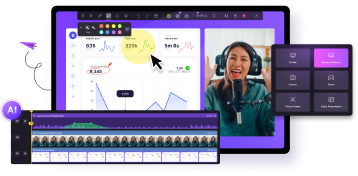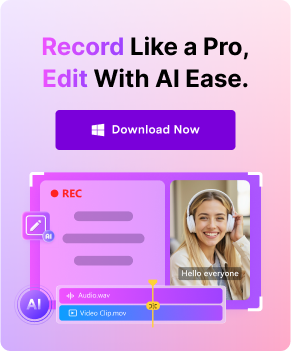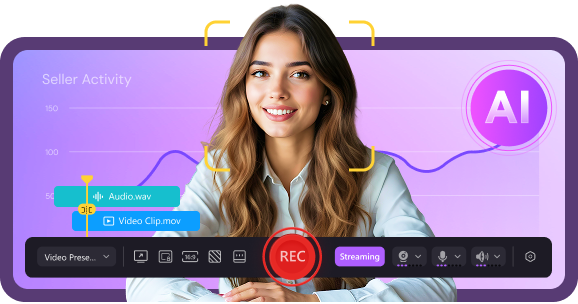Creating effective employee training videos is essential for fostering a productive, engaged, and skilled workforce.
Today, many companies are leveraging innovative video content to streamline training, engage employees, and ensure they retain critical knowledge. From compliance and safety to leadership and teamwork, the best training videos are tailored to meet diverse learning needs and provide accessible, interactive, and memorable experiences.
This article highlights ten highly effective employee training videos that have set new standards in educational content, demonstrating how visual learning can transform workplace training. Read on to discover the top picks.
In this article
Part 1: Why Create Training Videos for Employees?

Creating training videos for employees has become an essential strategy in corporate training.
One of the primary advantages of using videos for employee training is increased comprehension and information retention. Visual and auditory elements combined in videos help employees process and retain information more effectively than traditional text-based methods. This multimodal approach engages multiple senses, making the learning experience more immersive and memorable.
Furthermore, training videos offer unparalleled flexibility and accessibility. Employees can access these resources on-demand, allowing them to learn at their own pace and revisit content as needed. This flexibility is particularly valuable in today's hybrid work environments, where teams may be dispersed across different locations and time zones.
Part 2 :10 Influential Examples of Employee Training Videos
Let’s dive into the top 10 influential employee training videos examples that we’ve specially selected for you.
1. How Do You Organize And Start Employee Training Programs

Channel: Jason Schroeder
Duration: 11:49
This video provides a comprehensive overview of how to develop effective employee training programs tailored to organizational needs. Jason Schroeder clearly outlines the steps involved, from gathering data to understanding the audience and testing the training program. The structured approach and practical insights make it particularly useful for HR professionals and managers looking to enhance their training strategies.
2. How to Make An Employee Training Video (in 5 steps!) by

Channel: VEED STUDIO
Duration: 6:00
This video is a meta-example, teaching viewers how to create effective training videos themselves. It's particularly useful for organizations looking to develop their in-house training capabilities. VEED's channel focuses on providing easy-to-follow online video creation tutorials, making it an excellent resource for those new to creating training content.
3. Set New Employees Up for Success with an Effective Training by

Channel: ZingTrain
Duration: 53:00
ZingTrain's video likely offers valuable insights into onboarding new employees effectively. The channel focuses on developing effective employee training programs, making it a reliable source for best practices in this area. This video is likely beneficial for HR professionals and managers responsible for new hire orientation.
4. How to Have the Career Development Conversations by

Channel: Chris Littlefield
Duration: 9:24
This video addresses an important aspect of employee development - career conversations. Chris Littlefield, an expert in employee appreciation and workplace culture, provides valuable insights into fostering employee growth. This type of content is crucial for managers looking to support their team members' career progression.
5. The Best LMS for Employee Training, Small Business, or Selling Course (in 2 minutes)

Channel: eLearning Partners
Duration: 2:11
This video provides an insightful overview of various Learning Management Systems (LMS) tailored to different organizational needs. It highlights the best LMS options based on specific requirements, such as mobile accessibility for field employees or comprehensive tools for small businesses. The concise format and focused content help viewers quickly grasp the advantages of each LMS, making it a valuable resource for decision-makers looking to optimize their employee training processes.
6. 3 Ways to Make Employee Training For Free

Channel: eLearning Partners
Duration: 5:37
Another offering from eLearning Partners, this video provides cost-effective solutions for creating training content. It presents three practical methods for creating effective training programs without incurring costs. The presenters discuss using screen capture software like Loom, recording virtual meetings with Zoom, and creating "show and tell" videos using smartphones. The clear explanations, along with visual demonstrations, make it easy for viewers to implement these strategies, ensuring that training can be both accessible and impactful.
7. Fix Your Workflow: 5 Tactics to Improve Efficiency

Channel: ProcessDriven
Duration: 17:37
While not specifically about training, this video addresses workflow improvement, which is a crucial aspect of employee performance. ProcessDriven focuses on process improvement strategies, making it easy for employees to implement the strategies in their daily tasks. The engaging delivery and clear explanations of concepts like batching and specialization ensure that viewers can grasp complex ideas quickly, promoting better employee performance and morale by reducing frustration associated with inefficient processes.
8. Building workflows in monday.com course | Introduction to the course

Channel: Monday.com
Duration: 4:18
This video, while not providing channel information, likely offers insights into using project management tools effectively. This introductory video outlines a structured six-step methodology for building workflows within the monday.com platform. It is particularly suitable for employee training as it provides a clear roadmap for users to follow, ensuring they understand how to effectively utilize the platform. The use of engaging visuals and practical examples, including a case study from a client, helps demystify the process of workflow creation, making it accessible for employees at all levels.
9. How to Train Employees Effectively

Channel: Matterhorn Business Development
Duration: 8:00
This video provides a structured approach to employee training, emphasizing the importance of clear expectations and organized materials. Abby Johnson discusses breaking down tasks into manageable tiers, which helps employees grasp their responsibilities and progress in their roles effectively. The practical advice, combined with engaging visuals, makes it an excellent resource for managers looking to enhance their training programs.
10. 3 Tips for More Effective Training

Channel: Stephen Goldberg
Duration: 5:03
In this short video, Stephen Goldberg outlines three essential strategies for effective employee training: setting goals, conducting mid-training check-ins, and measuring results through follow-ups. This straightforward framework ensures that training is not only informative but also results-driven. The emphasis on personalized learning and ongoing support makes it particularly beneficial for organizations seeking to foster continuous development among their employees.
Overall, it's worth noting that the ideal training video for your employees will depend on your specific needs, industry, and company culture. The examples provided here offer a starting point for understanding the types of training videos available and how they can be used to enhance employee skills and knowledge.
Part 3: How to Create Training Videos for Employees?

Creating effective training videos for employees is a strategic process that enhances learning and retention. Here’s a guide outlining key steps to develop impactful training videos.
1. Define Learning Objectives and Audience
Start by identifying the specific skills or knowledge you want your employees to gain. Clear objectives help shape the content and ensure relevance to the audience.
2. Choose Video Type
Select the format that best suits your training goals. Options include:
- Instructor-led videos: Direct presentations from a knowledgeable person.
- Screencasts: Ideal for software training, showing step-by-step processes.
- Animated videos: Engaging for complex topics but may require more resources.
3. Script and Storyboard
A well-structured script is crucial. It organizes your thoughts and ensures clarity. Consider creating a storyboard to visualize scenes and transitions, which aids in maintaining flow and engagement throughout the video.
4. Record and Edit

During recording, maintain a clear focus on the objectives and engage your audience with a dynamic presentation style. Post-production is equally important; edit for clarity, add visuals, captions, and interactive elements like quizzes to reinforce learning. A reliable software you can use to record employee training videos is the DemoCreator Video Editor software.
DemoCreator is a versatile software designed for creating and editing videos efficiently. It offers multiple recording modes, which enables you to capture your screen, webcam, and audio simultaneously.
DemoCreator Video Editor is ideal for educators, marketers, and gamers alike. You can use it to enhance your videos with effects, annotations, and transitions seamlessly. Plus, it supports advanced features like AI video editing and audio enhancement, which makes it stands out as a comprehensive tool for both beginners and professionals.
Key Features
- Multiple Recording Modes: Capture screen, webcam, and audio separately or together.
- AI-Powered Editing: Utilize AI tools for automatic subtitle generation and background removal.
- Annotation Tools: Add text, shapes, and highlights to emphasize key points in videos.
- Customizable Layouts: Create tailored video layouts with ease using preset templates.
- Seamless Sharing Options: Directly share videos on popular social media platforms or through secure links.
Here are the detailed steps to create a training video for employees:
Creating a training video for employees is pretty straightforward if you have the right tools at your fingertips. Here is how it works using the DemoCreator software;
Step1Open Video Recorder
Launch the “DemoCreator” app on your computer and select “All-in-one Recorder.”

- In the recorder interface, turn on the toggle next to “Webcam,” “Audio,” and “Microphone.” Then, select the preferred area you want to “Capture.”
Step2Start Recording Video
Click the “REC” button to start recording the training video.
Step3Edit Recorded Video
After you complete the recording process, head to the “Video Editor.”

- In the video editing interface, you can adf annotation, captions, and do lots more to the video.

Step4Export Video
After editing the video, preview it to ensure it suits your requirements. Then, “Export” and save it to a desired path on your computer.
Conclusion
Employee training videos have become a go-to for many businesses to upskill and motivate their team. The ten videos featured in this article illustrate how effective training content can enhance learning, boost productivity, and foster a culture of growth within organizations. By investing in high-quality training resources, companies can equip their workforce with essential skills and knowledge to thrive in an ever-evolving workplace.
FAQs
-
What should be included in a employee training video?
A good training video should include the following essentials:
1.Clear Objectives: State what learners will gain from the video.
2.Engaging Content: Use visuals, animations, or demonstrations to illustrate key points.
3.Real-Life Examples: Include case studies or scenarios that employees can relate to.
4.Interactive Elements: Incorporate quizzes or prompts to encourage active participation.
5.Summary and Key Takeaways: Conclude with a recap of important concepts to reinforce learning. -
How do you structure training videos for employees?
There are several tips you can follow to structure training videos for employees. Here are some of them;
1.Introduction (5-10 seconds): Briefly introduce the topic and what viewers can expect to learn.
2.Content Segmentation: Break down information into digestible sections. Each segment should cover a specific point or skill.
3.Visuals and Demonstrations: Use graphics, animations, or live demonstrations to illustrate complex ideas clearly.
4.Engagement Points: Include questions or interactive segments throughout the video to maintain viewer interest.
5.Conclusion: Summarize key points and provide additional resources or next steps for learners.
6.Call to Action: Encourage viewers to apply what they’ve learned or complete follow-up tasks, reinforcing the video's objectives.



